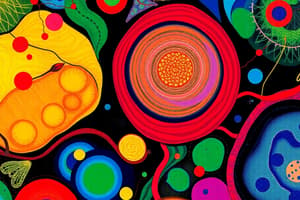Podcast
Questions and Answers
What is the basic unit of life according to cell theory?
What is the basic unit of life according to cell theory?
The basic unit of life is the cell.
How does evolution occur?
How does evolution occur?
Evolution occurs through natural selection.
What is the role of DNA in genetics?
What is the role of DNA in genetics?
DNA is the molecular basis of inheritance.
What processes do organisms use to maintain homeostasis?
What processes do organisms use to maintain homeostasis?
What distinguishes prokaryotic cells from eukaryotic cells?
What distinguishes prokaryotic cells from eukaryotic cells?
What is the function of mitochondria in a cell?
What is the function of mitochondria in a cell?
What is photosynthesis?
What is photosynthesis?
What are biomes?
What are biomes?
Flashcards are hidden until you start studying
Study Notes
Overview of Biology
- Biology is the scientific study of life and living organisms.
- It encompasses various fields such as ecology, microbiology, genetics, and evolutionary biology.
Major Themes in Biology
-
Cell Theory
- All living organisms are composed of cells.
- The cell is the basic unit of life.
- All cells come from pre-existing cells.
-
Evolution
- Life evolves through a process of natural selection.
- Common ancestry links all organisms.
- Adaptations occur through genetic variation.
-
Genetics
- Genes are the units of heredity.
- DNA is the molecular basis of inheritance.
- Traits can be dominant, recessive, or codominant.
-
Homeostasis
- Organisms maintain a stable internal environment.
- Processes include regulation of temperature, pH, and osmolarity.
-
Energy and Matter
- All living organisms require energy for growth, reproduction, and maintenance.
- Metabolic pathways convert energy from food into usable forms.
-
Interdependence of Organisms
- Ecosystems consist of interactions between organisms and their environment.
- Food chains and food webs illustrate energy flow and nutrient cycling.
Classification of Organisms
- Domain System
- Archaea: Ancient, single-celled organisms without a nucleus.
- Bacteria: Also single-celled but more diverse in form and function.
- Eukarya: Organisms with complex cells, including plants, animals, fungi, and protists.
Key Concepts in Cell Biology
-
Prokaryotic vs. Eukaryotic Cells
- Prokaryotic: Simple, unicellular, lacking a nucleus (e.g., bacteria).
- Eukaryotic: Complex, can be unicellular or multicellular, containing a nucleus (e.g., plants, animals).
-
Cell Organelles
- Mitochondria: Powerhouse of the cell, site of ATP production.
- Ribosomes: Sites of protein synthesis.
- Endoplasmic Reticulum: Rough (with ribosomes) and smooth (without ribosomes) functions in protein and lipid synthesis.
- Golgi Apparatus: Modifies, sorts, and ships proteins and lipids.
Ecology Basics
- Biomes: Major ecosystems defined by climate and vegetation (e.g., deserts, forests).
- Population Dynamics: Study of populations, their size, density, and growth patterns.
- Community Interactions: Includes predation, competition, symbiosis (mutualism, commensalism, parasitism).
Important Biological Processes
-
Photosynthesis
- Conversion of light energy into chemical energy by plants.
- Occurs in chloroplasts, primarily in leaves.
-
Cellular Respiration
- Process by which cells convert glucose and oxygen into energy (ATP), carbon dioxide, and water.
- Involves glycolysis, the Krebs cycle, and the electron transport chain.
Health and Disease
- Pathogens: Bacteria, viruses, fungi, and parasites that can cause diseases.
- Immune Response: The body’s defense mechanisms against pathogens (innate and adaptive immunity).
Important Figures in Biology
- Charles Darwin: Developed the theory of evolution by natural selection.
- Gregor Mendel: Father of genetics; established laws of inheritance.
- Louis Pasteur: Pioneered microbiology and vaccination techniques.
Overview of Biology
- Biology explores the study of life and living organisms.
- It encompasses various fields such as ecology, microbiology, genetics, and evolutionary biology.
Major Themes in Biology
- Cell Theory: The foundation of life, stating that all living things are composed of cells, the fundamental unit of life.
- Evolution: Life evolves through a process of natural selection, driven by genetic variation leading to adaptations.
- Genetics: The study of genes, the units of heredity, with DNA as the molecular basis of inheritance.
- Homeostasis: The ability of organisms to maintain a stable internal environment, crucial for survival.
- Energy and Matter: Life requires energy for various functions, obtained through metabolic processes that convert energy from food.
- Interdependence of Organisms: Ecosystems involve complex interactions between organisms and their environment, exemplified by food chains and food webs.
Classification of Organisms
- Domain System: A hierarchical system used to classify organisms based on shared characteristics.
- Archaea: Ancient, single-celled organisms without a nucleus, often found in extreme environments.
- Bacteria: Also single-celled, but more diverse in form and function, playing crucial roles in various ecosystems.
- Eukarya: Organisms with complex cells, including plants, animals, fungi, and protists.
Key Concepts in Cell Biology
- Prokaryotic vs. Eukaryotic Cells:
- Prokaryotic Cells: Simple, unicellular organisms lacking a nucleus, including bacteria.
- Eukaryotic Cells: Complex, can be unicellular or multicellular, with a defined nucleus, including plants, animals, fungi, and protists.
- Cell Organelles: Specialized structures within cells that perform distinct functions:
- Mitochondria: The powerhouses of the cell, responsible for generating energy (ATP).
- Ribosomes: Sites of protein synthesis, responsible for translating genetic information into proteins.
- Endoplasmic Reticulum (ER): A network of membranes involved in protein and lipid synthesis:
- Rough ER: studded with ribosomes, involved in protein synthesis.
- Smooth ER: lacks ribosomes, involved in lipid synthesis and detoxification.
- Golgi Apparatus: Modifies, sorts, and packages proteins and lipids, ensuring their delivery to the right destinations.
Ecology Basics
- Biomes: Major ecosystems defined by their climate and dominant vegetation, examples include deserts, forests, and grasslands.
- Population Dynamics: The study of population size, density, and growth patterns, crucial for understanding species survival and ecological balance.
- Community Interactions: Relationships between different species within a given area, including:
- Predation: One species hunts and kills another for food.
- Competition: Species compete for resources, impacting population growth and distribution.
- Symbiosis: Close, long-term interactions between different species:
- Mutualism: Both species benefit from the interaction.
- Commensalism: One species benefits, while the other is unaffected.
- Parasitism: One species benefits at the expense of the other.
Important Biological Processes
- Photosynthesis: The process by which plants convert light energy into chemical energy (glucose), using carbon dioxide and water.
- Occurs in chloroplasts, primarily in leaves.
- Cellular Respiration: The process by which cells convert glucose and oxygen into energy (ATP), carbon dioxide, and water:
- Involves three main stages: glycolysis, the Krebs cycle, and the electron transport chain.
Health and Disease
- Pathogens: Disease-causing agents, including bacteria, viruses, fungi, and parasites.
- Immune Response: The body's natural defense mechanisms against pathogens, involving innate and adaptive immunity.
Important Figures in Biology
- Charles Darwin: Developed the theory of evolution by natural selection, revolutionizing our understanding of life.
- Gregor Mendel: Considered the "father of genetics," established the fundamental laws of inheritance.
- Louis Pasteur: A pioneer in microbiology and the development of vaccination techniques, significantly reducing the prevalence of infectious diseases.
Studying That Suits You
Use AI to generate personalized quizzes and flashcards to suit your learning preferences.




